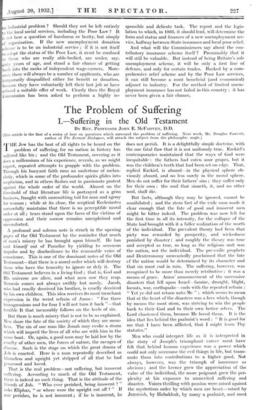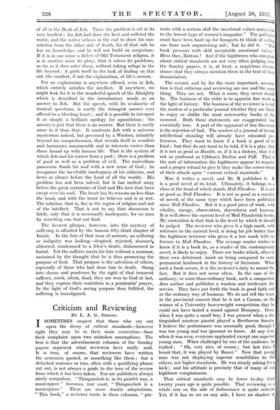The Problem of Suffering
I.—Suffering in the Old Testament BY REV. PROFESSOR JOHN E. MCFADYEN, D.D.
(This article is the first of a series of four on questions which surround the problem of suffering. Next week, Mr. Douglas Fawcett, author of The Zermatt Dialogues, will attack the subject from the philosophic angle.]
THE Jew has the best of all rights to be heard on the problem of suffering, for no nation in history has suffered like his ; and the Old Testament, covering as it does a millennium of his experience, reveals, as we might expect, repeated attempts to grapple with the problem. Through his buoyant faith runs an undertone of melan- choly, which in some of the profounder spirits glides into scepticism, and in others flashes out in passionate protest against the whole order of the world. Almost on the threshold of that literature life is portrayed as a grim business, fraught with unremitting toil for man and agony for woman ; while at its close, the sceptical Ecclesiastes sorrowfully maintains that there is no perceptible moral order at all ; tears stand upon the faces of the victims of oppression and their sorrow remains unexplained and uncomforted.
A profound and solemn note is struck in the opening pages of the Old Testament by the reminder that much of man's misery he has brought upon himself. He has cast himself out of Paradise by yielding to sensuous impulse and by disobedience to the reasonable voice of conscience. This is one of the dominant notes of the Old Testament—that there is a moral order which will destroy those who have the temerity to ignore or defy it. The Old Testament believes in a living God ; that is, God and His universe are alive, and what men sow they reap. Nemesis comes not always swiftly but surely. Jacob, who had cruelly deceived his brother, is cruelly deceived by his own children. This idea receives its most trenchant expression in the weird, refrain of Amos : " For three transgressions and for four I will not turn it back "—that terrible It that inexorably follows on the heels of sin.
But there is much misery that is not to be so explained. Men share the fate of the society of which they are mem- bers. The sin of one man like Jonah may evoke a storm which will imperil the lives of all who are with him in the same boat. Or, again, a good man may be laid low by the cruelty of other men, the forces of nature, the ravages of disease. Such is the stage on which the great drama of Job is enacted. Here is a man repeatedly described as blameless and upright yet stripped of all that he had possessed and loved.
That is the real problem—not suffering, but innocent suffering. According to much of the Old Testament, there is indeed no such thing. That is the attitude of the friends of Job. " Who ever perished, being innocent ? " asks Eliphaz, " or where were the upright cut off ? " If one perishes, he is not innocent ; if he is innocent, he does not perish. It is a delightfully simple doctrine, with the one fatal flaw that it is not uniformly true. Ezekiel's contemporaries maintained that the ways of God were inequitable : the fathers had eaten sour grapes, but it was the children's teeth that had been set on edge. That, replied Ezekiel, is absurd—in the physical sphere ob- viously absurd, and no less surely in the moral sphere. Men do not suffer for their fathers' sins ; they suffer only for their own : the soul that sinneth, it, and no other soul, shall die.
But facts, although they may be ignored, cannot be annihilated ; and the stern fact of the exile soon made it clear enough that the fate of good and innocent men might be bitter indeed. The problem was now felt for the first time in all its intensity, for the collapse of the State had brought with it a fuller realization of the worth of the individual. The prevalent theory had been that piety was rewarded by prosperity, and wickedness punished by disaster and roughly the theory was true and accepted as true, so long as the religious unit was the nation, not the individual. The pre-exilic prophets and Deuteronomy unweariedly proclaimed that the fate of the nation would be determined by its character and that sin must end in ruin. The suffering, however, was recognized to be more than merely retributive ; it was a means of grace. Amos' announcement of the successive disasters that fell upon Israel—famine, drought, blight, locusts, war, earthquake—ends with the repeated refrain : " Yet ye did not return unto Me " ; which seems to mean that at the heart of the disasters was a love which, though by means the most stern, was striving to win the people back to their God and to their own better selves. The Lord chastened them, because He loved them. It is the idea that lies behind the psalmist's word : " It is good for me that I have been afflicted, that I might learn Thy statutes."
Men who could interpret life as it is interpreted in the story of Joseph's triumphant career must have felt that behind human experience was a power which could not only overcome the evil things in life, but trans- mute them into contributions to a higher good. Not always, however, was the triumph of innocence so obvious ; and the keener grew the appreciation of the value of the individual, the more poignant grew the per- plexity at his exposure to unmerited suffering and disaster. Voices thrilling with passion were raised against the mysterious order by which men are beset—raised by Jeremiah, by Habakkuk, by many a psalmist, and most of all in the Book of Job. There the problem is set at its very hardest ; for Job had done the best and suffered the worst, and the writer refuses in the end to draw his con- solation from the other side of death, for of that side he has no knowledge, and he will not build on conjecture. If it is in one sense a defect of Old Testament religion, it is in another sense its glory, that it solves its problems, so far as it does solve them, without taking refuge in the life beyond : it girds itself to the task of finding on this side the comfort, if not the explanation, of life's sorrow.
For no explanation is anywhere offered, even in Job, which entirely satisfies the intellect. If anywhere, we might look for it in the wonderful speech of the Almighty which is described in the introductory words as an answer to Job. But the speech, with its avalanche of ironical questions, is surely the strangest answer ever offered to a bleeding heart ; and it is possible to interpret it as simply a brilliant apology for agnosticism : the answer is just that there is no answer. But there is surely more in it than that. It confronts Job with a universe mysterious indeed, but governed by a Wisdom, infinitely beyond his comprehension, that reveals itself in wonders and harmonies innumerable and in interests vaster than those bound up with human life. That is the system of which Job and his sorrow form a part ; there is a problem of good as well as a problem of evil. The marvellous panorama floods his soul with a new sense of God ; he recognizes the inevitable inadequacy of his criticism, and bows in silence before the Lord of all the worlds. His problem has not been solved, but it has melted away before the great certainties of God and His love that have swept over his soul. The heart has its reasons no less than the head, and with the heart he believes and is at rest. The solution, that is, lies in the region of religion and not of the intellect. That is not to say that discussion is futile, only that it is necessarily inadequate, for no man by searching can find out God.
The keenest glimpse, however, into the mystery of suffering is afforded by the famous fifty-third chapter of Isaiah. In the fate of that man of sorrows, no suffering or indignity was lacking—despised, rejected, shunnedi abhorred, condemned to a felon's death, dishonoured in burial. Yet the sufferer meets his fate without a murmur, sustained by the thought that he is thus promoting the purpose of God. That purpose is the salvation of others, especially of those who had done him to death. Stung into shame and penitence by the sight of that innocent sufferer, meek, silent, dead, they are won to God at last, and they express their contrition in a penitentifi prayer, In the light of God's saving purpose thus fulfilled, the suffering is transfigured.































 Previous page
Previous page